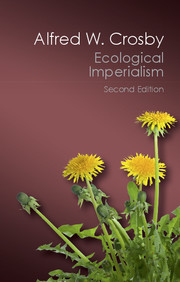Book contents
- Frontmatter
- Dedication
- Epigraph
- Contents
- List of Illustration
- Preface to the new edition
- Acknowledgments
- 1 Prologue
- 2 Pangaea revisited, the Neolithic reconsidered
- 3 The Norse and the Crusaders
- 4 The Fortunate Isles
- 5 Winds
- 6 Within reach, beyond grasp
- 7 Weeds
- 8 Animals
- 9 Ills
- 10 New Zealand
- 11 Explanations
- 12 Conclusion
- Appendix: What was the “smallpox” in New South Wales in 1789?
- Notes
- Index
3 - The Norse and the Crusaders
Published online by Cambridge University Press: 05 October 2015
- Frontmatter
- Dedication
- Epigraph
- Contents
- List of Illustration
- Preface to the new edition
- Acknowledgments
- 1 Prologue
- 2 Pangaea revisited, the Neolithic reconsidered
- 3 The Norse and the Crusaders
- 4 The Fortunate Isles
- 5 Winds
- 6 Within reach, beyond grasp
- 7 Weeds
- 8 Animals
- 9 Ills
- 10 New Zealand
- 11 Explanations
- 12 Conclusion
- Appendix: What was the “smallpox” in New South Wales in 1789?
- Notes
- Index
Summary
They went ashore and looked about them. The weather was fine. There was dew on the grass, and the first thing they did was to get some of it on their hands and put it to their lips, and to them it seemed the sweetest thing they had ever tasted.
–Vinland SagasHe [richard the lion-heart] pursued the Saracens over the mountains, until following one of them into a certain valley, he transfixed him, causing him to fall dying from his horse. On his overthrow the King looked up and saw afar the city of Jerusalem.
–Itinerarium RicardiWhat Date Shall we pick for completion of the Old World Neolithic Revolution in the lands of its origin? Suppose we have it terminate a neat 5,000 years ago with domestication of the horse – an arbitrary choice, perhaps, but a good approximation. Between that era and time of development of the societies that sent Columbus and other voyagers across the oceans, roughly 4,000 years passed, during which little of importance happened, relative to what had gone before.
Let us apply the technique of time–lapse photography to the four millennia following completion of the Old World Neolithic, exposing a frame only every half century or so. When we then view our film at normal speed, we are struck with the uneventfulness of this long period. Nothing in those four millennia compares in importance with the domestication of the horse, for instance. Indeed, very little happened that was truly new – just more of the same sort of thing. The epochal innovations of the Neolithic – cultivation of wheat, domestication of the pig, invention of the wheel – overshadow all that followed for scores of human generations. There are some new developments – invention of the arch, domestication of the camel, among others – but they are of minor significance compared with what had gone before. Old World civilization does not continue to innovate broadly nor attain higher levels of energy; it simply continues to spread. Empires pop up and down; few but the pharaonic, the Roman, and the Han
last long enough to be clearly discerned as our film rolls through the projector.
- Type
- Chapter
- Information
- Ecological ImperialismThe Biological Expansion of Europe, 900–1900, pp. 41 - 69Publisher: Cambridge University PressPrint publication year: 2015



